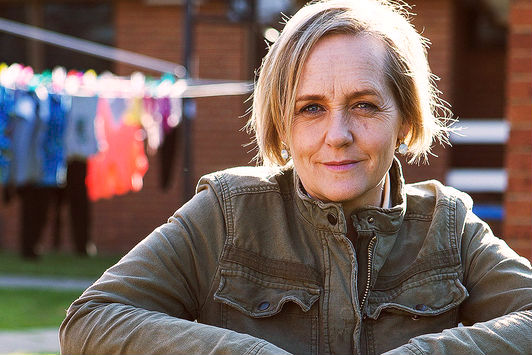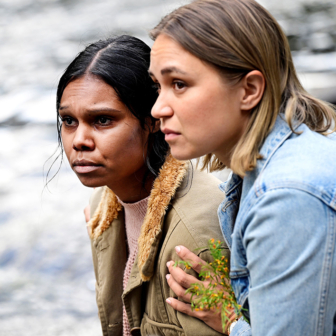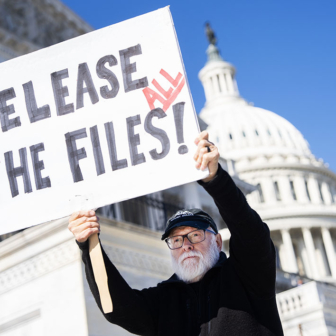Every week, it seems, another item on television breaks out of the twenty-four-hour media cycle to command public attention in an ongoing process of commentary and replay. Waleed Aly’s stump speech on the Islamic State, delivered on Ten’s The Project on 16 November, was last week’s TV event, and generated over twenty-eight million views on the program’s Facebook page. Responses rolled out across front pages over the next few days, and distinct echoes were apparent in the prime minister’s parliamentary address on national security.
This week, the airwaves were dominated by Hitting Home, Sarah Ferguson’s two-part documentary for the ABC, which was followed by a Q&A special on domestic violence. The broadcast coincided with White Ribbon Day on 25 November, and politicians fronted up to take the opportunity to say the right thing at the right moment. Sarah Ferguson’s growing reputation as a leading current affairs journalist is part of the media story surrounding her program. Hitting Home follows the extraordinary critical success and political impact of The Killing Season, shown on ABC in June this year, and her appointment as Kerry O’Brien’s replacement on Four Corners was announced this week.
Hitting Home is in many ways state-of-the-art documentary-making and I wouldn’t dissent from the chorus of admiration that has greeted it. I do, though, have some strong reservations about the phenomenon of the media bandwagon and the way it serves to galvanise public outrage on critical issues.
Aly’s “ISIL is weak” message was a rhetorically driven fallacy – no one with any real knowledge of its operations is saying any such thing – but it caught on as an expression of feel-good communal superiority. The moral dramaturgy of “us” and “them” has a powerful appeal in situations where there is a threat to some deeply shared tradition of cultural values. The Islamic State is not our system: it is in every sense a foreign body, and our greatest fear is that it may become the enemy within.
Domestic violence presents more complex moral challenges because it is indeed the enemy within. On the one hand, there is a need for condemnation, and for a change in cultural attitudes so that it is overtly criminalised rather than covertly tolerated. On the other, the perpetrators are not aliens or monsters, but men in our midst. The conventions of moral dramaturgy are of no help at all here.
A documentary treatment risks tapping into these conventions. In a talk given back in 1996, Dennis O’Rourke, director of such landmark Australian documentaries as Cunnamulla and The Good Woman of Bangkok, described how he set out to disturb the moral orientations of his audiences in a bid to “resist and repudiate the lure of self-gratification which comes from making earnest statements to the converted.” The investigative documentary has a tendency, he said, to make the viewer feel part of an enlightened elite. “And it follows that those who watch-to-feel-good will identify with their omniscient heroes – the film-makers, who thus become heroic protagonists in their own films.”
Ferguson is in no way catering to such tendencies, and her presence in the scenes of Hitting Home serves to ground it as an exploration of human experience rather than an exercise in moral judgement. Nevertheless, she is now invested with a high level of authority as a crusader penetrating the moral fog of our political culture. Like Waleed Aly, she has a kind of cult status as a media figure, and although she shows no signs of wanting to exploit it, the status of Hitting Home as a television event is due more to her involvement than to its subject matter, critically important as that may be.
Call Me Dad, a second documentary on domestic violence aired on the ABC this week, acquired underdog status, with little promotion and, so far, a rather low-profile critical reception. It deserves more attention. The project of independent film-maker Sophie Wiesner, it was funded with public contributions through the Documentary Australia Foundation. Its budget and production values don’t bear comparison with those of Hitting Home, whose production team is headed by Nial Fulton and Ivan O’Mahoney of In Films. Their track record includes work for HBO, CNN, Discovery, Channel 4 and the BBC.
This asymmetry in the status of the two programs is unfortunate. Hitting Home focuses primarily on victim impact and police procedure. “Why do men do it?” Ferguson asks, but the question remains unanswered. It is in Call Me Dad that we get to see the other side of the picture: the men who are struggling to manage their own violent impulses. Taken together, the two documentaries deal with grim realities while providing an encouraging picture of just how effective some of the best response programs are. They also reflect upon each other in ways that expose a troubling rift in perspective.
In Hitting Home we see specialist police officers, counsellors and doctors issuing the same warning to women living with violent male partners: they cannot afford to continue under the illusion that “he’ll change.” Some of these women express a sense of shame that this hope kept them in a situation so damaging to their children. The advice from the professionals seems to be unanimous – there is only one way with a domestic violence situation, and that is out.
Call Me Dad follows a group of men engaged in a sixteen-week program designed to help them achieve behavioural change. While it remains to be seen how this will work out in the long term, several of them were evidently experiencing a real process of transformation. At the end of the film, the wife of one of the participants faces the camera. She has been interviewed several times before, stressed and tearful, telling of her ordeals. Now she is composed, confident. “They say a leopard never changes its spots,” she says. “I don’t believe that. I don’t think anyone should ever write off anyone. Ever.”
Given the limited appeal of investigative documentary to television audiences, producers are usually keen to accentuate the more sensational aspects of a topic, promising to show the viewer scenes of danger, hidden worlds, locations that are normally off limits. There’s the crusading element that O’Rourke fulminates against: something will be exposed to view; people will be brought to account.
In Hitting Home, Ferguson takes us inside a women’s refuge, rides with police responding to emergency calls, eavesdrops on a men’s therapy session in prison, and films from inside the victim’s safe room at a local court. There are close-ups of serious injuries and recordings of emergency calls from victims under attack. The stories are harrowing and confronting in their detail.
But it is the less sensational aspects of the picture that capture and hold the attention. Rather than just focusing on the horrors, Ferguson seeks out the professionals who have developed a range of life-saving response programs. We watch Genelle Warne, domestic violence liaison officer with Blacktown Police, as she assembles the documents from some forty cases to present at the weekly court hearings, and later as she and an assistant respond to a new call. The victim is taken immediately to Blacktown hospital, where a forensic doctor records the injuries.
The dialogue in these situations is calm and practical. “They’ll ask you specific questions. Just answer those questions. Take your time… Today is your day to take control back.” At the refuge several members of staff are shown working the phones as they try to organise an emergency admission. “She’s so scared she just left the house,” one reports. “He tried to run her over with the car.” “All right,” says the case manager, matter-of-factly. “Is she safe? Where is she now?” Where crisis is core business and people are escaping from chaos, this refusal to be stirred by alarm helps to create a centre of gravity.
In the refuge, women who have fled a private hell go about the daily routines of life, and Ferguson simply joins in, loading the washing machine, making coffee, and talking to the children, with whom she seems to have an easy rapport. In one scene, she is shown carrying a toddler who is looking up at the night sky, pointing at stars. The children’s faces are blurred to conceal identities, but they are a vivid presence, always playing in the background. Play itself seems a marvellous gift after what they have been through. There’s no need for any speech to camera to make the point that the restoration of childhood is a small miracle in these circumstances; skilful editing and structure do the work of communication much more effectively.
The second part of Hitting Home starts with a visit to the South Coast Correctional Centre in Nowra, where a ten-week program for domestic violence offenders is commencing. From Ferguson’s cursory exchanges with these men, it seems clear that most of them have difficulty in acknowledging what they have done. Annie Grenfell, the program facilitator, has an uphill struggle but insists on the value of “chip, chip, chipping away.” The participants are taken through a program of “offence mapping,” documenting the events leading up to an outburst. But we don’t really get any follow through on this. How effective is it? What are the factors that led these particular men into a pattern of behaviour that is destroying their own lives as well as those of the women and children who are their victims?
This is where Call Me Dad provides a vital part of the picture. As the men assemble for their first meeting, their anger is palpable. It’s as if they see themselves as the oppressed, needing to fight back at a world that is unfair, illogical and overwhelming in its demands. One speaks directly to the camera: “Happy family? Real happy family? Doesn’t exist. It’s a fucking myth.” The bitterness of the outburst, though, expresses something these men have in common. While they are forced to recognise themselves as its destroyers, family is what they most want and need in their lives.
The discussion in the sessions, facilitated by reformed offender David Nugent, can easily go off the rails, but the volatility also produces moments of insight. Surprisingly, these are men who break easily. One of them arrives in a stressed state because his boss screamed at him “full on.” Nugent puts the obvious question: how did that make him feel? “Helpless,” says the guy, “fearful, embarrassed, lost, confused, belittled. It was a phenomenal amount of feelings. The power and control’s all in his court.”
“Sounds like the universe is giving you a taste of your own medicine,” says the man sitting next to him.
Not all domestic violence offenders would respond to such a program, or be willing to follow it. They are as various as any other category of offenders. The importance of seeing them as individuals, each with a different set of problems and formative influences, is perhaps the biggest challenge facing us as a society if we want to get beyond the moral dramaturgy and take some collective responsibility. •




